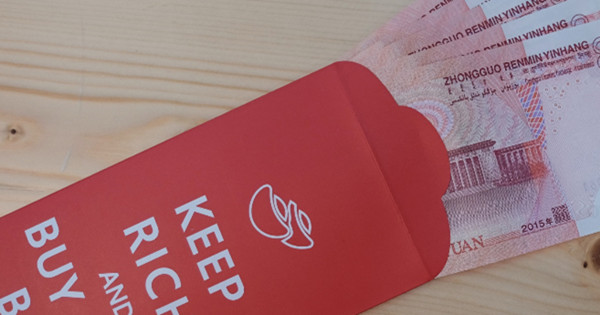
The giving of cash gifts to relatives and friends probably ranks equal alongside food, family, travel, and TV galas as the pillars of the Chinese Spring Festival season. Known as 压岁钱 (yāsuìqían, “money against misfortune”) when given to children or simply 红包 (hóngbāo, “red envelope” or “red pocket”), after the festive wrapping in which the money is presented, the many prescribed rules of giving and receiving these cash offerings are a bulwark of the Confucian family hierarchy as well as a source of anxiety to cash-strapped people with big families everywhere.
It used to be difficult to estimate how much money was changing hands every Spring Festival through hongbao—but as mobile applications like WeChat, QQ, and Alipay started to add hongbao-payment to their services, we start to get clearer pictures of just how widespread is the practice. Note that online and offline hongbao trends are not always equivalent; the big cash gifts prepared for close relatives are still traditionally exchanged offline, though increasingly through payment platforms like Alipay. On the other hand, hongbao sent through social media-oriented mobile apps tend to be token offerings to friends and acquaintances or prizes for other members of your WeChat groups to “snatch” before the total runs out. This year, WeChat reports that 46 billion hongbao transactions took place through its platform between the Lunar New Year’s Eve and fifth day of the New Year (January 27 ? February 1), a 43 percent increase from last year, with an average of 37 hongbao transactions per user.
Though WeChat has never revealed how much money has changed hands in total during each Spring Festival, Alipay reported last year 250 million hongbao were sent through its payment system on New Year’s Eve had an average of 182.6 RMB. In sum, there’s a lot of money changing hands all around the nation, which provides us a fount of economic information. Here are a few economic implications drawn from hongbao-giving.
1. The value of hongbao transactions relates to regional economic conditions…except when it doesn’t
For traditional, offline gifts of hongbao, self-reporting is still the primary means of locating patterns and trends in the numbers of hongbao exchanged, the socially acceptable value per hongbao, and average haul per person in each region of China. Over the past week, an essay circulating on WeChat titled “People in Guangdong Still Give Out 5 RMB Hongbao” inspired netizens around China to “air out” (晒)—that is, share with their social networks—the typical value of hongbao given in their home region.
As summarized by the public WeChat account Panyu WeChat By Data, the Yangtze River Delta region (comprising Shanghai and parts of Jiangsu and Zhejiang provinces), an economic powerhouse region stereotyped as the home of the nouveau riche, had the highest self-reported starting value of hongbao in the nation: four figures for close relatives, hundreds among friends, with some households reporting five-figure hongbao from direct senior relatives and myth-shrouded six or seven figures among the tuhao. However, any expected correlation between the hongbao largesse and general economic prowess of a region ends after this promising start, as it’s economically depressed northeastern (Dongbei) and northwestern (Xibei) China that claim the next spots, with hongbao starting at 100 for acquaintances, several hundred for other relatives or close friends, and going into four figures when giving to younger, close relatives.


















































